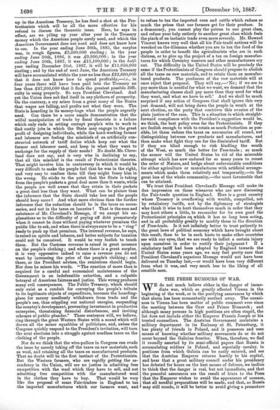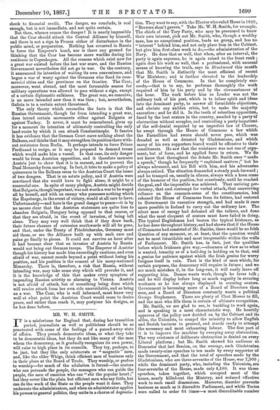THE FRESH RUMOURS OF WAR.
Nv-E do not much believe either in the danger of imme- diate war, which so greatly affected Vienna in the beginning of the week, or in the pacifying assurances by which that alarm has been momentarily soothed away. The uneasi- ness in Vienna has been matter of public comment ever since the meeting between the Czar and Prince Bismarck ; and although many persons in high positions are often stupid, the list does not include either the Emperor Francis Joseph or his trusted counsellors. The Austrian Government maintains a military department in its Embassy at St. Petersburg, it has plenty of friends in Poland, and it possesses and uses means of knowing whether military movements do or do not occur beyond the Galician frontier. When, therefore, we find it roundly asserted by its semi-official papers that Russia is accumulating soldiers in Poland, and especially cavalry, in positions from which Galicia can be easily entered, and see that the Austrian Emperor returns hastily to his capital, and hear that a great military council under his presidency has debated for hours on the best means of defence, we incline to think that the danger is real, but not immediate, and that the peaceful assurances are the result of hints to the Press that the Emperor wishes to avoid the appearance of menace, that all needful preparations will be made, and that, as Russia may still recede, it will be better to avoid giving a premature
shock to financial credit. The danger, we conclude, is real enough, but is not immediate, and not quite certain.
But then, whence comes the danger? It is nearly impossible that the Czar should attack the Central Alliance by himself, and there is not a sign in France either of disturbance in the public mind, or preparation. Nothing has occurred in Russia to force the Emperor's hand, nor is there any ground for thinking that the Czar has become more warlike during his residence in Copenhagen. All the reasons which exist now for a great war existed before the last war scare, and the Russian Government nevertheless did not go to war. On the contrary, it announced its intention of waiting its own convenience, and began a war of worry against the Germans who flood its ootu- mercial cities and the provinces on the frontier. The Czar, moreover, went abroad, and the most favourable season for military operations was allowed to pass without a sign, except of a certain diplomatic sulkiness. The great war, We conceive, is no more intended now than it was then ; but, nevertheless, Galicia is to a certain extent threatened.
The only theory which reconciles the facts is that the Russian Government, though far from intending a great war, does intend certain movements either against Bulgaria or against Turkey. It never, it must be remembered, gives up for a moment its intention of ultimately controlling the only land-route by which it can attack Constantinople. It fancies it has evidence that the German Court cares nothing about the Balkans, and thinks that it may strengthen its position there with- out resistance from Berlin. It perhaps intends to force Prince Ferdinand to resign, or it may be prepared to demand terms which would make him a vassal. In that case, its only danger would be from Austrian opposition, and it therefore menaces Austria just to show that it is in earnest, and to prevent the Dual Monarchy from moving. In fact, it tries to make a policy of quiescence in the Balkans seem to the Austrian Court the lesser of two dangers. That is an astute policy, and if Austria were convinced that she would have to fight alone, it might be a successful one. In spite of many pledges, Austria might decide that Bulgaria, though important, was not worth a war to be waged all by herself, and with an enemy who possesses nothing which the Hapsburgs, in the event of victory, would at all care to have. Unfortunately—and here is the grand danger to peace—it is by no means clear that the Austrian statesmen are quite free to abandon Bulgaria, Hungary being opposed to that course, of that they are afraid, in the event of invasion, of being left alone. They may very well think that if they draw back, their future chances of extension southwards will all be gone, and that, under the Treaty of Friedrichsruhe, Germany must aid them, or see the Alliance built up with such care and pains go finally to pieces. It could not survive an hour after it had become clear that an invasion of Austria by Russia would not bring out German troops. The Emperor of Austria, though his history has made him exceedingly cautious, and even afraid of war, cannot recede beyond a point without losing his position, and his position is the cement of his many-nationed Monarchy. There is, therefore, a risk that Russia, without intending war, may take some step which will provoke it, and it is the knowledge of this that makes every symptom of impending Russian activity so alarming to Vienna. Austria is not afraid of attack, but of something being done which will render attack from her own side unavoidable, and so bring on a war. The Czar, who is well informed, must know very well at what point the Austrian Court would cease to desire peace, and rather than reach it, may postpone his designs, as he has done before.























































 Previous page
Previous page